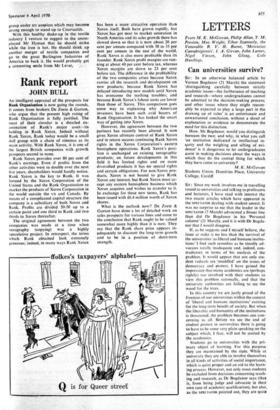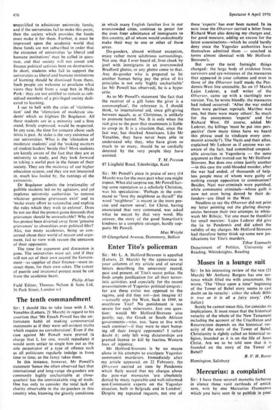LETTERS
From M. K. McGowan. Philip Allan, T. M. Preston, Max Wright, Tibor Szamuely, the Venerable R. V. H. Burne, 'Mercurius Cantabrigiensis', I. A. Girvan, John Lamer, Nigel Vinson, John Gloag, Cole Rawlings.
Can universities survive?
Sir: In an otherwise balanced article by Vernon Bogdanor (21 March) the statement `distinguishing carefully between strictly academic issues—the furtherance of teaching and research—where undergraduates cannot be admitted to the decision-making process; and other issues where they might reason- ably be expected to play a large part in the drawing up of rules' is an unfortunate and unwarranted conclusion, without a shred of explanation or evidence to demonstrate the need for this distinction.
How, Mr Bogdanor, would you distinguish between the two; and why, in what you call 'an institution dedicated to intellectual in- quiry and the weighing and sifting of evi- dence' is it dangerous to let undergraduates assist in making decisions about the ways in which they do the central thing for which they have come to university?
M. K. McGowan Students Union, Dumfries Place, University College, Cardiff
Sir: Since my work involves me in travelling round to universities and talking to professors and lecturers, I have read with interest the two recent articles which have appeared in the SPECTATOR dealing with student unrest. It was no surprise to me that the leader in the SPECTATOR (7 March) advocated a firmer line than did Dr Bogdanor in his 'Personal column' (21 March), and it is with Dr Bogda- nor that I would disagree.
If, as he suggests and I myself believe, the issue at stake is no less than the survival of the universities 'as liberal and humane institu- tions' I find such remedies as he timidly ad- vocates totally inadequate and, indeed, con- tradictory in terms of his analysis of the problem. It would appear that not only stu- dent radicals are 'muddled' on the issues of democracy and protest. I have gained the impression that many academics are (perhaps rightly) too involved with their students to view this problem rationally, and that the university authorities are failing to see the wood for the trees.
In this country we are justly proud of the freedom of our universities within the context of 'liberal and humane institutions' existing for the long-term benefit of society. But when the liberality and humanity of the institutions is threatened, the problem becomes one con- cerning us all. Before we see the end of student protest in universities there is going to have to be some very plain speaking on the subject which, I fear, will not be started by the academics.
Students go to universities with the pri- mary object of learning. For this purpose they are maintained by the state. While at university they are able to involve themselves in all kinds of activities of social importance, which is quite proper and an aid to the learn- ing process. However, not only must students be excluded from decisions concerning teach- ing and research, as Dr Bogdanor says (that
is, from being judge and advocate in their own case of academic qualification), but also, as the SPECTATOR pointed out, they are quite
unqualified to administer university funds; and if the universities fail to make this point, then the society which provides the funds must make it for them. Further, it must be impressed upon the academic world that these funds are not subscribed in order that the existence of universities 'as liberal and humane institutions' may be called in ques- tion, and that society will not cosset and finance political activists bent on destruction. In short, students who fail to support the universities as liberal and humane institutions of learning should be dismissed from them. Such people are welcome to proclaim what views they hold from a soap box in Hyde Park : they are not entitled to remain as sub- sidised members of a privileged society dedi- cated to learning.
I say to hell with the cries of 'victimisa- tion' and the 'alienation of moderate stu- dents' which so frighten Dr Bogdanor. All these students are in a minority and a firm stand, firmly expressed, would be respected. In any case, the time for concern about such trivia is past. At stake is the very existence of our universities. What is the 'alienation of moderate students' and the 'making martyrs of student leaders' beside this? Most students are keenly aware of the fact that they are at university to study, and they look forward to taking a useful part in the future of their society. They are the mainstay of our higher education system, and they are not interested in, much less fooled by, the rantings of the extremists.
Dr Bogdanor admits the irrationality of gullible students led on by agitators, and yet implores university authorities `to remove whatever genuine grievances exist' and to 'make every effort to rationalise and explain the rules which they wish to enforce'. Does he not see that the protest game demands that grievances should be unresolvable? Why else has protest been diverted away from 'genuine grievances' to absurdities over political files? Alas, too many academics, being so con- cerned about their world of reason and argu- ment, fail to view with reason the unreason of their opponents.
The time for argument and discussion is gone. The universities must act, and if they will not act of their own accord the Govern- ment—as supplier of their finance—must in- struct them, for their own sakes. The cancer of puerile and irrational protest must be cut from the academic heart.
Philip Allan Field Editor; Thomas Nelson & Sons Ltd, 36 Park Street, London wt



































 Previous page
Previous page